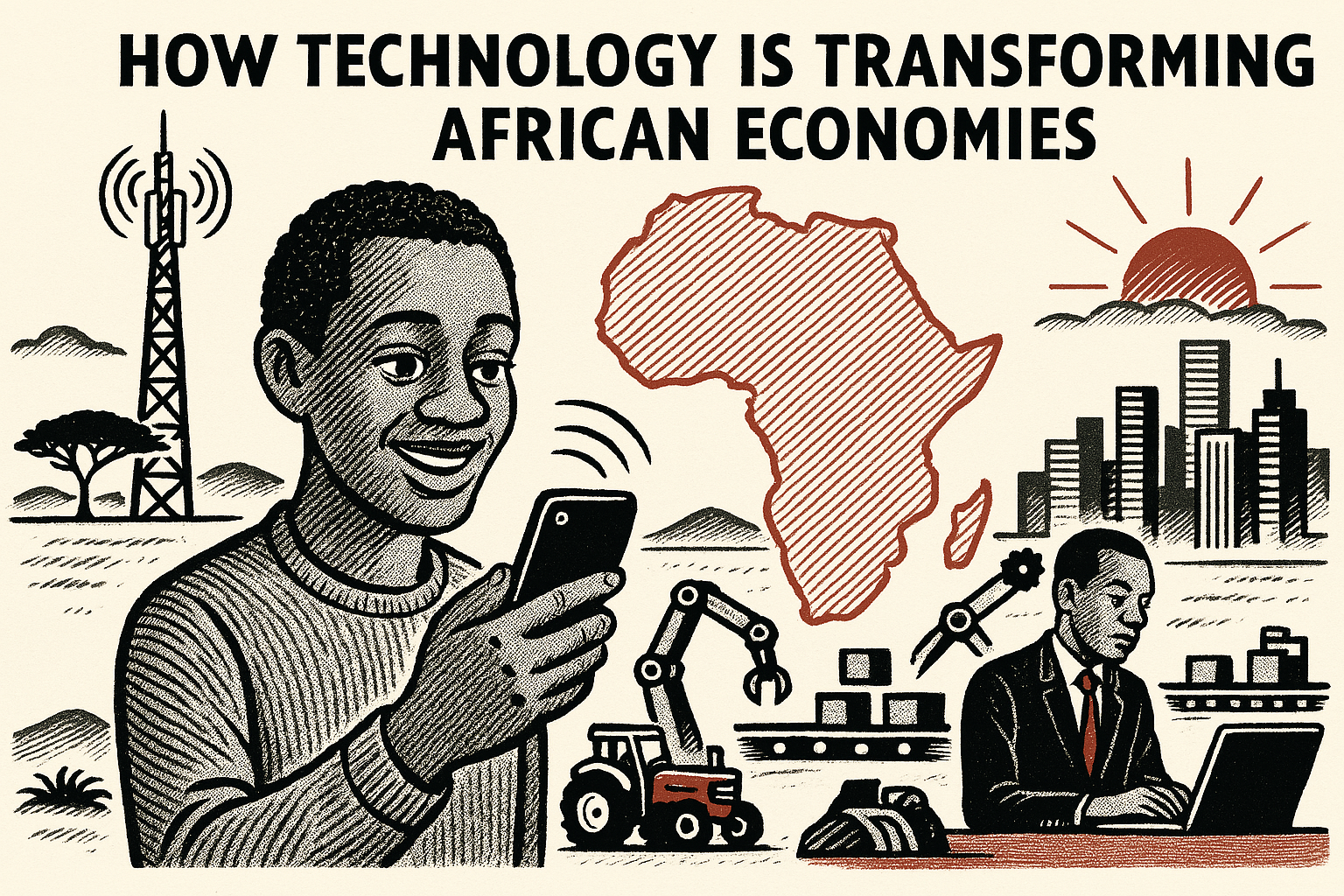In a bustling open-air market in Nairobi, a small business owner swipes her thumb across a smartphone screen. There’s no cash exchanged, no point-of-sale machine, just a ping confirming payment through mobile money. A generation ago, she might have been invisible to the formal banking system—one of millions operating in the shadows of the global economy. Today, with nothing more than a mobile phone and internet access, she participates in Africa’s sweeping digital transformation. Across the continent, a grassroots tech revolution is underway. From the shores of Lagos to the hills of Kigali, Africans are using technology not just to connect, but to create, compete, and redefine what economic participation looks like.
At the center of this transformation is the humble mobile phone. Once a luxury, it has become the continent’s most powerful development tool. By 2021, Africa accounted for 70% of the world’s $1 trillion mobile money transactions, handling an astonishing $701 billion in value (Quartz). The numbers are remarkable, but the stories behind them even more so. A rural farmer sending money to her daughter at university, a motorcycle courier receiving instant payments, a street vendor building a savings cushion without ever stepping into a bank—all powered by simple SMS-based services like Kenya’s M-Pesa. The mobile phone didn’t just disrupt finance in Africa—it democratized it. With over 621 million registered mobile wallets and counting (Quartz), mobile money has leapfrogged legacy banking, making financial inclusion a reality for communities long ignored by traditional institutions.
But the mobile revolution wasn’t just about money. It brought the internet to the people—often the only portal to information, opportunity, and the wider world. By 2023, around 37% of Africans were online, up from a mere 16% a decade earlier (Ecofin Agency). This growth is uneven and still below the global average of 67%, but the trajectory is promising. On these networks, young Africans are teaching themselves to code, launching businesses on Instagram, and joining global conversations on Twitter and TikTok. Walk through a market in Accra or ride a bus in Kampala, and chances are you’ll see someone watching a coding tutorial on YouTube or running a side hustle through WhatsApp. The smartphone has become a library, a mentor, a storefront, and a bank—all in one.
From this connectivity has emerged a new force: the African tech startup. A decade ago, the idea of a thriving startup ecosystem in Africa felt more like aspiration than reality. Today, more than 700 tech hubs dot the continent, offering co-working spaces, accelerators, and crucial mentorship (African Leadership Magazine). In Cairo, young developers are building apps that solve traffic gridlock. In Cape Town, engineers are creating platforms that link small-scale farmers to real-time market prices. In Lagos, innovators are crafting financial services tailored to local realities. This wave of entrepreneurship isn’t riding on hype—it’s solving problems that have long gone unaddressed.
Investors, once skeptical, are now paying attention. In 2022 alone, African startups attracted $5.2 billion in funding, nearly quadrupling the figure from just two years earlier (African Leadership Magazine). Even as venture capital cooled globally in 2023, African startups continued to draw interest, not just for their growth potential but for their ingenuity. Fintech leads the pack. Companies like Nigeria’s Flutterwave and Paystack (acquired by Stripe) built seamless payment systems in a landscape fragmented by currency, regulation, and infrastructure gaps. Their success isn’t just financial—it’s symbolic. It proves that African companies can build world-class tech on African soil for African needs, and then scale globally.
The innovation is not confined to the usual suspects. While Nigeria, Kenya, South Africa, and Egypt dominate headlines, cities like Dakar, Kigali, Accra, and Kampala are building serious tech reputations. Rwanda has positioned itself as a regulatory sandbox for emerging technologies, offering an environment that welcomes experimentation. In Senegal, startups are innovating in education and e-commerce. And Ghana, often overlooked, is producing talent and platforms that are quietly going global. In Nigeria, the ICT sector contributed 18.4% to GDP in 2022, surpassing even oil (African Leadership Magazine). Projections suggest that by 2025, the broader internet economy could inject $180 billion into Africa’s GDP ([African Leadership Magazine]). For a continent long defined by commodity exports, this signals a profound shift.
Global players have taken notice. Google, Facebook (now Meta), Huawei—they all want a slice of Africa’s digital future. Facebook is laying undersea cables to enhance connectivity; Google has opened AI research hubs in Accra. These moves aren’t charity—they’re business. Africa’s mobile-first, youthful population is among the most promising consumer bases of the 21st century. But African firms aren’t rolling over. Jumia, Africa’s e-commerce giant, competes directly with Amazon. Local YouTubers and TikTok influencers are challenging outdated narratives and creating new ones with massive audiences. It’s a new digital sovereignty—one where Africans shape the content, platforms, and norms that define their online lives.
China, too, has embedded itself in this digital future—not just through device sales but by funding infrastructure and partnering with startups. While these investments have helped expand access, they raise questions about digital dependency. African policymakers and civil society are calling for data localization, better regulation, and support for domestic tech ecosystems. Tunisia’s pioneering “Startup Act” has become a blueprint for how policy can energize innovation—a model now being studied by Kenya and others.
The African diaspora is also playing a crucial role. Many of Silicon Valley’s African-born engineers are channeling capital and expertise back home. Startups like Andela, which trains African software developers and connects them with global clients, emerged from this nexus of local ambition and international support. This reverse brain drain is turning into a brain circulation—skills and capital flowing across borders, fuelling growth and inspiration in both directions.
Yet for all the promise, a digital divide still threatens to leave many behind. In 2022, just 33% of sub-Saharan Africans used mobile internet, with Central Africa lagging at 17% (GSMA). Women remain disproportionately excluded, often due to cost, literacy, or restrictive norms. Rural areas, still off-grid and off-network, risk being frozen out of the very revolution meant to empower them. Closing these gaps will require smart public investment—extending towers to remote areas, offering low-cost data, and training communities in digital literacy. Without that, the digital divide could become a chasm.
Then there are the challenges of governance. Cybercrime is rising. Regulatory frameworks often lag behind technological realities. Some governments, fearing dissent, have shut down the internet during elections or protests—blunt-force actions that harm economies and trust alike. Civil society is increasingly vocal, demanding open, secure, and inclusive digital environments. Meanwhile, automation looms on the horizon. As AI and robotics evolve, there is concern that some low-skilled jobs—especially in services—may disappear. The imperative is clear: Africa must not only digitize but educate, retrain, and build industries that create new, sustainable employment.
Looking ahead, the African Continental Free Trade Area (AfCFTA) may be one of the most important enablers of tech scale. With 55 countries aiming to unify regulations, payment systems, and cross-border services, it could open vast new markets for digital entrepreneurs. The World Bank estimates that AfCFTA could boost the continent’s income by 7% and lift 30 million people out of extreme poverty by 2035 ([World Bank]). Much of that potential hinges on digital trade, regional data integration, and interoperable services.
Across the continent, the next frontier is already being mapped. In Tunisia and Ethiopia, drones and AI are optimizing agriculture. In Nigeria, blockchain is being tested for land registries and remittances. In Kenya, regulators are piloting frameworks for cryptocurrency and peer-to-peer lending. These are not borrowed solutions—they are local answers to local problems, with the potential for global impact. In 2020, an African-born engineer at Google helped build an AI system that improved flood forecasting, directly saving lives in vulnerable regions. That’s the power of local expertise shaping global technology.
It’s tempting to speak of Africa’s digital rise as a future event. But it’s happening now, in the kinetic energy of tech hubs, in the creative hustle of youth, in the quiet determination of an informal worker launching an app with borrowed Wi-Fi. As the “Silicon Savannah” matures, don’t be surprised if the next global tech giant doesn’t come from San Francisco or Shanghai, but from Lagos, Nairobi, or Kigali. The continent that was once dismissed as the world’s margin is now its frontier. And at that frontier, innovation is not a luxury—it’s a necessity, driven by urgency, creativity, and a fierce refusal to be left behind.
References
- Quartz. Mobile money transactions and digital wallet statistics. https://qz.com
- Ecofin Agency. Internet access trends in Africa. https://ecofinagency.com
- African Leadership Magazine. Startup funding and tech hub growth. https://africanleadershipmagazine.co.uk
- GSMA. Mobile internet usage in sub-Saharan Africa. https://www.gsma.com
- World Bank. AfCFTA projections and economic impacts. https://www.worldbank.org



